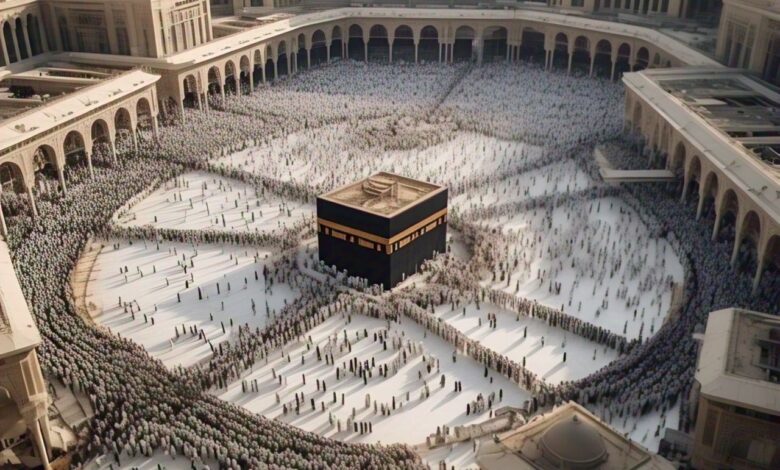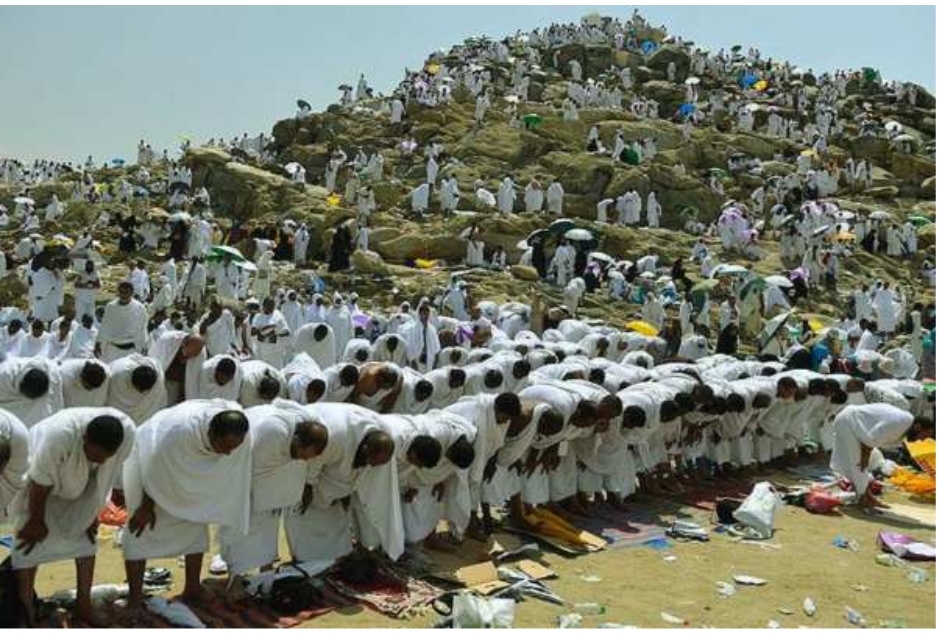Why Millions of Muslims Flock to Mecca For Hajj?

Why do millions of people flock to Mecca, Saudi Arabia, at this time of year every year? How is the pilgrimage performed in Islam? And why is it so important to Muslims?
In this article, we clarify these common questions and more.
Here, we will learn the following:
- Hajj in a nutshell
- What do Muslims do on a hajj?
- Why do Muslims perform Hajj?
- How do Muslims prepare for Hajj?
- How do Muslims dress for Hajj?
- The History of Hajj
- Conclusion
Journey to Holly City of Mecca
Hajj, in Arabic, means pilgrimage. It is a life-changing journey to the holy city of Mecca in the month of Dhul-Hijjah (the 12th month of the Islamic calendar), during which over two million Muslims perform specific Hajj rituals according to the Quran and Sunnah. Similar to other forms of religion, Hajj involves the soul, mind, and body in worshiping Allah.
Given its importance, it is considered the fifth pillar of Islam. Therefore, every Muslim, man or woman, is obliged to perform Hajj if they have the financial and physical means to do so at least once in their lifetime. Hajj is about leaving the worries and trappings of this world behind to draw closer to Allah in a unique environment where the high principles, values , and goals of Islam are exercised.
What do Muslims do on a hajj?
The Hajj consists of many stages with many details. However, in the context of this article, we will only briefly go through some of the main stages:
1- Circumnavigation of the Kaaba “Tawaf”
Tawaf is one of the main rites of the pilgrimage. It refers to walking in circles around the Kaaba in a counterclockwise direction. A Tawaf consists of seven complete circuits, each beginning and ending at the black stone within the Kaaba.
It has a profound message: Muslims must act in a manner consistent with the lovely symphony of obedience, just as electrons revolve around the nucleus and the sun revolves around the earth in total surrender to the commands of the Creator.
2- Safa and Marwa Hills.
After performing Tawaf, the pilgrim will perform what is known as Sa’i (walking and running between the two hills of Safa and Marwa). They start Sa’i from the mountain of Safa and walk towards the hill of Marwa. This completes one lap.
The pilgrim will then return to Safa to complete the second lap until the seventh lap. It is an essential ritual in memory of Prophet Abraham’s (AS) wife, Hagar, and her struggle in the desert in search of water for her son, Prophet Ishmael (AS). Sa’i symbolizes the continuous struggle we encounter throughout our lives, as Hagar herself experienced.
3- From the foot of the Mount of “Arafat”
The most important ritual of the Hajj is the “Day of Resistance,” when Muslims gather on the Plain of Arafat and recite prayers from noon to sunset. The ceremony is intended to grant Muslims absolution of their sins, and if the ritual is missed, the pilgrim will not be able to complete the Hajj.
All over the world, Muslims who did not attend Hajj are recommended to fast on this day. Mount Arafat was where the beloved Prophet Muhammad (ﷺ) delivered his final sermon.
4- Rami (Stoning the Devil)
Pilgrims perform the act of Rami by stoning the Jamraat al-Aqabah. Seven stones are thrown at the structure of the pillar. The stoning of Jamrat is performed in memory of the act of Prophet Abraham (AS) when the devil tried to discourage him from following the command of Allah (الله). In response, Prophet Abraham (AS) threw small stones to make the devil disappear.
5- Nahr
After the completion of Rami, on the 12th of Dhul-Hijjah, Muslim pilgrims are advised to sacrifice an animal, such as a camel or a lamb. The meat of the sacrificed animal should be distributed to people in need.
6- The People and the Taqsir
This means shaving the head, while Taqsir means shortening or cutting the hair. After performing the sacred sacrifice, male pilgrims are advised to have their heads completely shaved or cut short. Although forbidden from shaving their heads, women are advised to cut off a lock of their hair. The act of Halq and Taqsir symbolizes a Muslim’s complete devotion to Allah (ﷺ) and detachment from worldly appearances.
Why do Muslims perform Hajj?
Muslims perform Hajj simply because it is commanded by God, as per Chapter 2:
And complete the Hajj and Umrah for the sake of Allah.
“Complete the pilgrimage (Hajj) and the lesser pilgrimage (Umrah) for Allah…”
[Quran 2:196 ]
According to Chapter 3:
Indeed, the first God Home[of worship] established for mankind was at Makkah, which was blessed and gave guidance to the world. There are clear signs – the standing place of Abraham. And whoever enters it shall be safe. And Hajj to the kaaba is a duty that mankind owes to Allah, those who can afford the expenses (for one’s journey). And whoever disbelieves – then indeed, Allah is free from the need of the worlds.
“Certainly, the first (Sacred) House, erected for the human race, is that of Bakka, where the blessing resides, guiding humanity. Closes obvious signs: There is the Resort of Abraham, and whoever takes refuge there will be safe. The pilgrimage to the House is a duty towards God, on the part of all human beings, who are in a position to undertake it; however, whoever denies this should know that God can do without all humanity.”
[Quran 3:96-97 ]
Furthermore, the Hajj journey has many benefits on both an individual and community level. It is a unique opportunity for renewal of faith and repentance to God, during which the Muslim trains himself in good manners such as patience, sacrifice, generosity, and punctuality.
Furthermore, he strives to avoid sins by spending long days in righteous acts such as praising God, praying, studying the Qur’an, fasting, and performing other rites of Hajj. At the end of the Hajj, he purifies himself of evil traits such as selfishness and greed by making sacrifices and distributing his meat among people experiencing poverty.
In this multinational gathering, Muslims from various nations interact and get to know each other. They are reminded that God sees them all equally and that piety is the only criterion of differentiation between human beings.
O mankind, indeed, We have created you from male and female and made you peoples and tribes that you may know one another. Indeed, the most noble of you in the sight of Allah is the most righteous of you. Indeed, Allah is Knowing and Acquainted.
“O mankind! We have created you from male and female and have divided you into peoples and tribes so that you may know one another. Surely, the most honorable of you in the sight of God is he who is most godly. Surely God is All-Knowing and All-Aware.”
[ Quran 49:13]
Interestingly, Muslims are allowed to trade during this journey, which shows how Islam offers a beautiful balance between our spiritual and materialistic needs. (This article explores the rewards and benefits of Hajj in detail.
How do Muslims prepare for Hajj?
A Muslim’s best friend during this journey is a balanced approach and a positive attitude. The eligibility of a successful Hajj is preparation before the Hajj journey, extra patience during the trip, and sincere effort to improve oneself after the journey.
Keeping the following steps in mind, they should continually ask Allah to help them. Only He can make the difficult easy; without His help, we are lost.
1- Physical Preparation:
- Gather the necessary supplies so you don’t forget anything.
- Write down some supplications to memorize or repeat frequently. Additionally, they can jot down some notes or reflections that will help preserve the experience.
2- Spiritual and Mental Preparation
- Read notes and articles on the Hajj rites in advance to get into the proper spiritual frame of mind.
- Know what to expect and set expectations.
- Evaluate yourself before leaving for Hajj. As an experienced Hajji stated: “Look at your weaknesses and shortcomings. Repent of all the sins you are committing and your weaknesses. Do not go to Hajj to continue to commit any known sin when you return. Your intention must be to stop it and fight against it.”
How do Muslims dress for Hajj?
The first rite of the Hajj is to wear the Ihram. The Ihram is a seamless white garment made of two pieces of cloth or towel; one covers the body from the waist down to the knees, and the other is thrown over the shoulder. Abraham and Muhammad wore this garment. Women dress as they usually do. Men’s heads must be uncovered, and both men and women may carry an umbrella.
The Ihram is a symbol of purity and simplicity. It also indicates the equality of all people in the sight of Allah. When the pilgrim dons their white garment, they enter a state of purity that prohibits fighting, committing violence against man or animal, and having marital relations.
Once he puts on his Hajj clothes, the pilgrim cannot shave, cut his nails, or use any perfume, and he will keep his clothes unstuck until he completes the pilgrimage. To learn more about Ihram, check out this article on Ihram.
The History of Hajj
Although Hajj is something that was taught to Muslims by the Prophet Muhammad (peace and blessings be upon him), its origins can be traced back to the teachings of another of Islam’s beloved prophets, Abraham (AS) (peace be upon him), thousands of years earlier.
The Hajj, which Muslims still perform today, was first performed by the Prophet Muhammad (peace and blessings be upon him) in 628 CE, during Dhul-Hijjah. However, Dhul-Hijjah was also a holy month for the pagan Arabs in pre-Islamic Arabia.
During this month, fighting was prohibited for the Arabs, who also made pilgrimage to the Kaaba – the cubic structure of the Holy Mosque ( Masjid al-Haram ), which at the time served to homes the Arabs’ pagan idols.
That place is known today by Muslims as Baitullah, or “the House of God.” It plays a vital role in Hajj rites, but it is a mosque and not something Muslims love. The Kaaba was built by Abraham (AS), or Prophet Abraham, thousands of years before at the command of Allah – it is because of Abraham (AS) that Muslims perform the Hajj. For more Kaaba, check this article:
Conclusion
Every year, millions of Muslims from all over the world arrive in Mecca on the lifelong spiritual journey of Hajj, where one encounters Allah in the context of unparalleled diverse and multicultural gatherings. It is a great favor that Allah (glory be to Him) has bestowed upon His servants so they may draw closer to Him and have their sins forgiven. Prophet Muhammad (ﷺ) indicated:
The Messenger of God, may God bless him and grant him peace, said: “Whoever performs Hajj and does not utter obscenities or commit sins will return as on the day his mother gave birth to him.”
“If anyone makes the pilgrimage for the love of God without speaking immodestly or acting wickedly, he will return [free from sin] as on the day his mother gave birth to him.”
[Hadith]
It is now easy to see that for two or three months, from deciding and preparing for Hajj until returning home, a tremendous impact is made on the hearts and minds of the pilgrims. This process involves a sacrifice of time, money, comfort, and many desires and physical pleasures—and all this simply for the sake of Allah, without any worldly or selfish motives.
Along with a life of constant piety and virtuousness, the continual remembrance of Allah and the desire and love for Him in the pilgrim leaves a mark on his heart that lasts for years. The pilgrim witnesses at every step the marks left by those who sacrificed everything in submission and obedience to Allah.
They fought against the whole world, suffered hardships and tortures, and were condemned to banishment. Still, finally, they made the word of Allah supreme and subdued the false powers that wanted man to submit to entities other than Allah.
Haleema Limited, the Luton travel agents, offers Hajj packages from UK and aims to provide a spiritual journey that touches the deep glance of cleanliness.



